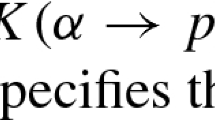Abstract
It is often claimed that anti-realists are compelled to reject the inference of the knowability paradox, that there are no unknown truths. I call those anti-realists who feel so compelled ‘faint-hearted’, and argue in turn that anti-realists should affirm this inference, if it is to be consistent. A major part of my strategy in defending anti-realism is to formulate an anti-realist definition of truth according to which a statement is true only if it is verified by someone, at some time. I also liberalize what is meant by a verification to allow for indirect forms of verification. From this vantage point, I examine a key objection to anti-realism, that it is committed to the necessary existence of minds, and reject a response to this problem set forth by Michael Hand. In turn I provide a more successful anti-realist response to the necessary minds problem that incorporates what I call an ‘agential’ view of verification. I conclude by considering what intellectual cost there is to being an anti-realist in the sense I am advocating.
Similar content being viewed by others
References
Beall, J. C. (2000). Fitch’s proof, verificationism, and the knower paradox. Australasian Journal of Philosophy, 78, 241–247. doi:10.1080/00048400012349521.
Dummett, M. (2001). Victor’s error. Analysis, 61, 1–2. doi:10.1111/1467-8284.00260.
Hand, M. (2003). Knowability and epistemic truth. Australasian Journal of Philosophy, 81, 216–228. doi:10.1080/713659633.
Marton, P. (2006). Verificationists versus realists: the battle over knowability. Synthese, 151, 81–98. doi:10.1007/s11229-004-6269-4.
Tennant, N. (1997). The taming of the true. Oxford: Clarendon.
Williamson, T. (1987). On the Paradox of knowability. Mind, 92, 256–261.
Williamson, T. (2000). Tennant on knowable truth. Ratio, 13, 99–114. doi:10.1111/1467-9329.00113.
Acknowledgements
The author gratefully acknowledges support from the Social Sciences and Research Council of Canada, grant number 410-2006-214. The author also thanks Tim Wyatt for numerous interesting discussions on knowability and an anonymous reviewer for a number of helpful and patient comments.
Author information
Authors and Affiliations
Corresponding author
Rights and permissions
About this article
Cite this article
Hudson, R.G. Faint-hearted Anti-realism and Knowability. Philosophia 37, 511–523 (2009). https://doi.org/10.1007/s11406-008-9174-0
Received:
Revised:
Accepted:
Published:
Issue Date:
DOI: https://doi.org/10.1007/s11406-008-9174-0



